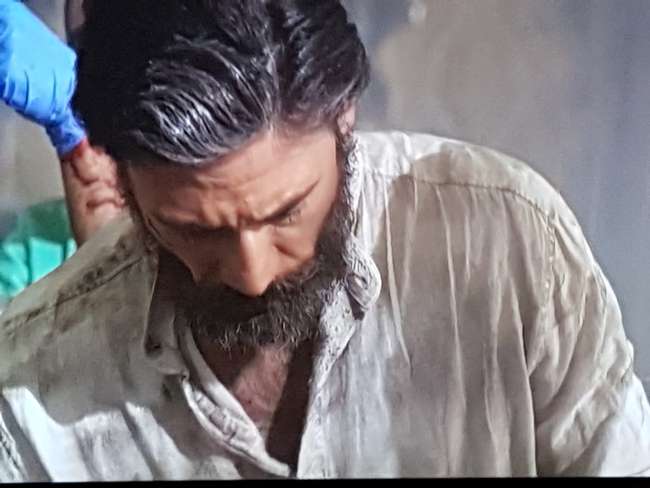Don Curry sniffs the mountain air
Жарыяланган: 08.02.2017
Бюллетенге жазылыңыз
Don Curry loves the sea. That is undisputed. Whenever possible, he chooses hotels directly on the coast or at least rooms with sea views. The endless expanse of water, the soothing rhythm of the waves, it all has a unique fascination for him. However, it would be unbearable for him to spend his days entirely on the beach, like many package tourists on a typical vacation. No, the sea serves him more as a pleasant backdrop, an upscale ambiance, a soothing background noise to round out his travel experiences.
The sound of the sea also began the day. Early in the morning, Don Curry went to the breakfast buffet at the INDeco Hotel, had some cereal, French toast, and papayas, along with overly sweet juice and terrible tea (no better than the terrible coffee yesterday) - and checked out. The need for room renovations left a negative impression, but the incredibly friendly staff made up for it once again today. Not only did the bellhop accompany him to the car at 8:00 a.m., but the chief receptionist and the restaurant manager also wanted to bid him a personal farewell.
First, he had to catch up on a missed activity from yesterday. The so-called "Crocodile Bank" opened its doors at 8:30 a.m. and showcased almost all crocodile species in the world, as well as some Indian snakes, monitor lizards, and turtles on its premises. The large enclosures were mainly occupied by hundreds of marsh crocodiles, some enjoying the first rays of sunlight of the day while piled on top of each other. Unfortunately, the over 5m long giant crocodile "Croc," the star of the facility, showed some diva tendencies and didn't even reveal the tip of its tail. Don Curry was particularly interested in the very rare gharials, which specialize in catching fish with their long, thin snouts. One particularly mighty gharial even lay in an underwater tank photogenically right by the glass. However, there wasn't much movement to be observed anywhere, crocodiles also diligently practiced the morning laziness that Don Curry could understand quite well.
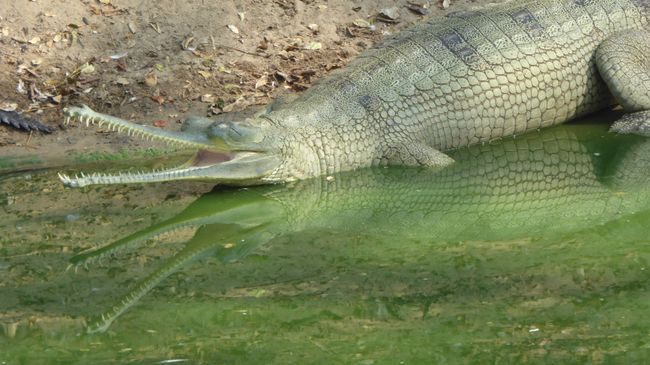
In Kanchipuram, the next destination, there was no sign of laziness. This formerly important royal city is now somewhat off the tourist beaten path, but it boasts numerous magnificent and architecturally valuable temple complexes. At the entrance to the city, the Varadaraja Perumal Temple was already waiting. As soon as Don Curry entered the temple courtyard, a seller approached him with camera tickets: he had to pay almost €0.08 to be allowed to take photos in the temple. The ticket seller also introduced himself as a Brahmin and Vishnu priest, and before Don Curry could do anything, he once again had a temple guide by his side, but this time one with excellent English skills and a love for details. He immediately took Don Curry to the 100-pillar hall, which dates back to the 16th century and actually consists of about 100 massive, monolithic, and highly elaborately sculpted black granite pillars. The Brahmin pointed out the details of a pillar, explained, asked for photographs, showed the backside, explained, asked for photos, showed this pillar, showed that pillar, asked for photos, explained, pushed Don Curry to a certain spot, asked for photos, showed another pillar... In a very short time, every pillar had received at least some attention, and Don Curry had the strange impression that he had taken more photos than he actually wanted to.
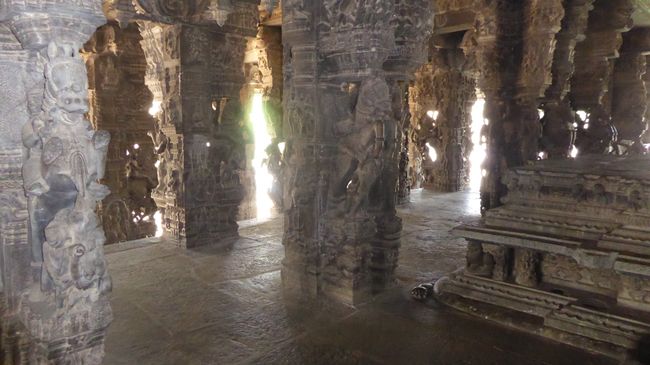
With particular enjoyment, the Brahmin pointed out the Kamasutra scenes, asked for photos, and grinned somewhat suggestively. At the end of his hectic intensive tour, he promptly demanded €8, claiming to be an old man and that this temple was the most beautiful in Kanchipuram. Don Curry couldn't quite follow this argument and rather saw the short working time of 15 minutes - albeit extremely filled minutes; he also appreciated the guide's knowledge and finally gave him €4. The rather indignant Brahmin tried to discuss it, but Don Curry abruptly ended his hectic monologue by leaving. Two other temples awaited his visit. However, this 100-pillar hall was undoubtedly one of the most splendid and artistically elaborate temple structures he had visited in India so far.
The Kailadatra Temple is considered the oldest temple in Kanchipuram. It is a direct successor to the buildings of Mamallapuram and served as a model for later, much larger Hindu structures. Its limited dimensions and its magnificent figurative decoration made it appear particularly charming. Much still seemed somewhat archaic, but it also clearly demonstrated the great skill of the artists involved. The official temple guard, whom Don Curry had immediately turned down as a possible guide at the beginning, kindly pointed him to the last remaining frescoes in a side chapel, without expecting any reward.
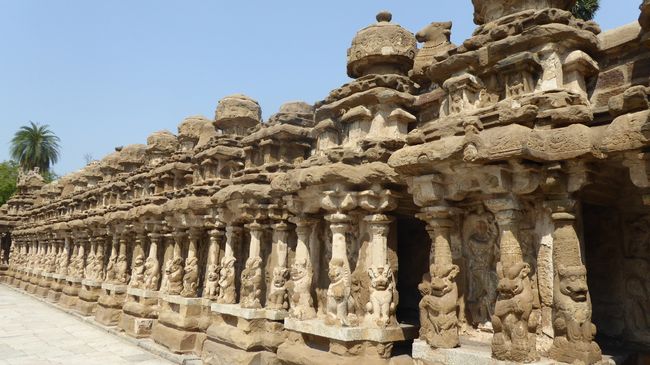
The conclusion of the Kanchipuram temple tour was the largest of the local Hindu temples, the Ekambaranath Temple. However, it impressed Don Curry far less than its two predecessors. One reason was surely that important parts were closed due to restoration work, including the 1000-pillar hall. Other areas were only accessible to Hindus, so the size of the temple quickly became relative. For lunch, Prince recommended the noble Regency Hotel, where Don Curry was the first lunch guest at around 12:45 p.m. A waiter with a black hairnet wanted to push the lunch buffet onto him, but Don Curry preferred to order à la carte: an excellent lemongrass soup with shrimp as a starter, followed by a magnificent chicken tomato curry with a divine sauce, complemented by two kulcha breads. The only negative memory of the Regency Hotel was that as a non-guest, Don Curry was not allowed to use the Wi-Fi free of charge.
While Don Curry peacefully and sleepily digested his meal, Prince drove towards the next destination: the Arulmigu Arunachalesvara Temple in Tiruvannamalai. Built in front of a massive pyramid-shaped mountain, this temple is one of the largest in India. However, extensive restoration measures were also underway here, especially the painting of the temple towers. Therefore, most of the buildings were scaffolded. For once, Don Curry didn't mind, as he hardly had any time available anyway - the drive to the place of accommodation would still be long.
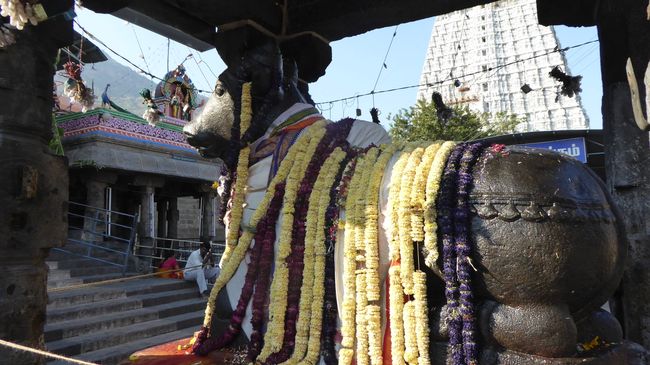
Prince was also relieved to see Don Curry again so quickly. He set off at a rapid pace. Yercaud, the destination, is a true mountain town located at an altitude of around 1300 meters. The journey after dark became serpentinesque on a narrow road, fortunately almost without oncoming traffic. Don Curry seemed to be the only guest at the Hilton Hill Resort. It had nothing to do with the American hotel chain, but it was built like an American motel. The rooms were individual bungalows with parking right in front of the door. Each bungalow had 2 extremely large rooms and 2 fully equipped bathrooms, but the furnishings seemed more than Spartan. The bedroom, for example, featured a king-size bed, a sideboard, and a nightstand, barely filling one-fifth of the unusually spacious room. Otherwise, there were only white tiles, white walls, and bright neon lights for illumination - no decoration, no wall art, no doormats. These bungalows exuded such sterile discomfort that one would prefer to flee immediately. Due to this non-ambience and also due to the altitude, an unusual coolness pervaded everything. Heating options were naturally not available.
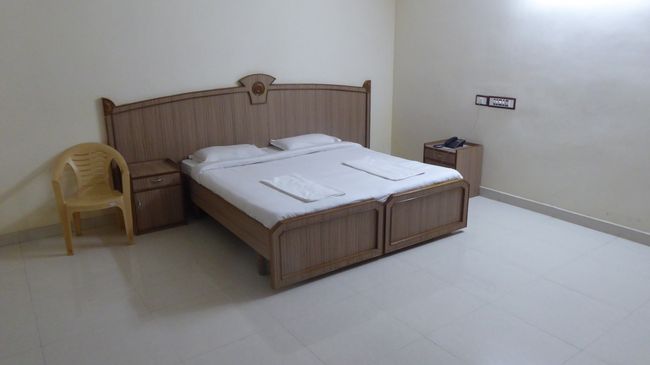
So Don Curry had no choice but to find another way to warm up. He first went to the hotel restaurant, which could easily have matched his bungalow in terms of coziness - presumably the same untalented interior designer was at work here. Don Curry quickly rushed out again before anyone could notice him and ended up in the restaurant right next door. Here, loud music and some fabric on the windows and tables at least created some atmosphere. Don Curry was handed a three-sided menu with dense writing, and the waiter waited directly and impatiently for the order. Don Curry was the only guest here too, so there was nothing else to do. Initially, he was served an aluminum jug of hot water; at outside temperatures around 20°C, Indians probably needed it to warm up, but Don Curry was far from feeling cold. He ordered an herbal soup, the famous chicken chettinadu, cucumber raita, and 2 paratha breads. Soon the soup was in front of him: hot and steaming, and so full of herbs that it almost looked like a stew; it was also characterized by a very intense spiciness. The chicken chettinadu was more than spicy: thick pieces of chicken in a very chili-heavy dark creamy sauce, accompanied by wonderfully greasy parathas. Thanks to the bread and the raita, he managed to enjoy at least part of the delicious curry until all taste buds finally surrendered, tears streamed from his nose, and sweat dripped heavily from his forehead. Once again, he realized why spicy food is called "hot" in English. Along with a freshly prepared lemon soda, the whole meal cost less than €4.
So with his inner heat, Don Curry could easily face the cool mountain air of Yercaud, but above all, the icy non-atmosphere of his bungalow. Perhaps in his dreams, he would once again be able to listen to the sound of the sea...
Бюллетенге жазылыңыз
Жооп
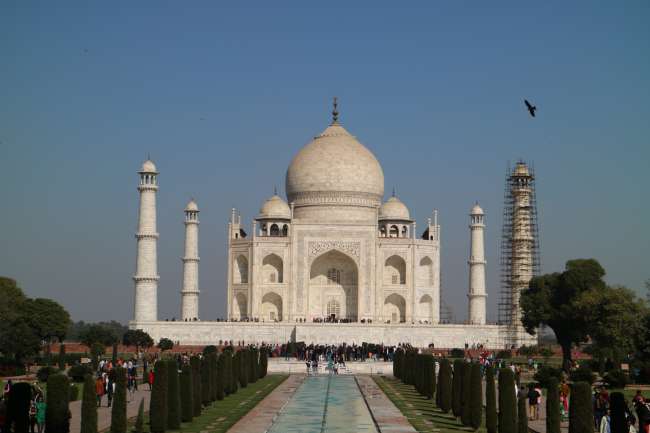
Саякат баяндамалары Индия

